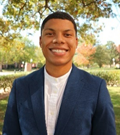CHIBE Q&A with SUMR Scholar Devin Brown


The Summer Undergraduate Minority Research Program (SUMR), founded in 2000 by Penn’s Leonard Davis Institute of Health Economics (LDI) and Wharton School’s Health Care Management Department, is a summer internship that connects undergraduate students from underrepresented minority groups to research groups in health services, population health, and clinical epidemiology at Penn. These scholars work with Penn faculty members on mentored research projects and present their projects at the End of SUMR Research Symposium.
Several SUMR scholars, including Devin Brown from the University of Oklahoma, worked with Center for Health Incentives & Behavioral Economics (CHIBE) faculty members. Brown is Class of 2022 and majoring in Foundational Sciences of Life in the Universe. Learn more about him in our CHIBE Q&A below.
You’re working on a pilot test with Dr. Alexander Fanaroff called “Gamification and Social Incentives to Augment Medication (GAME) Adherence.” Can you tell us a bit more about this project?
This project with Dr. Fanaroff examines the ability of behavioral economic approaches — gamification, social support, social accountability, and more — to improve medication adherence for patients with hypertension and hyperlipidemia. We are testing a combination of these approaches to reduce risk factors for cardiovascular disease as a part of a greater project called the Atherosclerotic Cardiovascular Disease Initiative led by Dr. Kevin Volpp, the director of CHIBE.
What has your experience been like as a SUMR scholar this summer?
I understood that accepting my position as a SUMR scholar this summer would be a valuable decision to make, but I had no clue just how significant this experience would end up being. Given my prior experience with research, I came into this summer with the belief that it was something that just wasn’t for me; however, I leave this program with a newfound passion for research and a refined vision for the role that it will play in my future career.
I could not have predicted how much I would enjoy both of my projects and how much I would learn from the program as a whole. With such insightful exposure to the field of health services research, I was able to further develop, and even expand, the list of topics that truly interest me in the realm of health care. These topics ranged from health disparities to social determinants of health and now include others like behavioral economics and early childhood development. I was also able to receive incredible mentorship from Dr. James Guevara, Dr. Alex Fanaroff, and Dr. Kevin Volpp as they all found ways to make me feel like a valued member of their research teams, while teaching me about what it means to be a health services researcher.
I cannot understate my gratitude for SUMR, Joanne Levy, LDI, and all of the people that help this machine function. I can fully credit this program with creating one of the most impactful pivots I have had in my personal, academic, and professional trajectories.
What would you like to do in the future?
This upcoming fall, I will be applying to several MPH programs across the country. In a more distant future, I plan to attend medical school and go on to use medicine, public health, teaching, and now research to eliminate health disparities in medically underserved communities. More than anything, I’d love to be a great father.